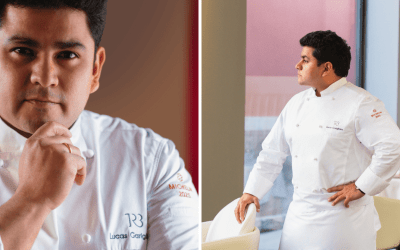When it comes to making, drinking, and embracing craft beer, there’s perhaps no city more dedicated to the cause than Portland, Oregon.
In Portland, beer is ingrained in the culture of the city and people from all walks of life enjoy having pints of the hoppy elixir. From dive bars to upscale establishments, no matter which type of bar or restaurant you go to, customers will find a variety of craft beers to choose from.
Considering this collective obsession with beer, it’s no surprise that the city is littered with craft beer bars where the sole focus is to present customers with the most intriguing selection possible. Beer bars in the city live and die by their tap list so selecting what to offer is no small feat.
On a recent visit to Portland, Hosco had the opportunity to chat with Tommy Hahs, bar manager and beer buyer for Beer O’Clock, one of the city’s premier craft beer bars.
Tommy is an Oregon native with nearly a decade of experience in the hospitality industry. He gave us some key insight into what it’s like to be a craft beer bar manager, his journey in the industry, and what makes Portland such a special city for working in hospitality.
Tell us about how you got your start working in the craft beer world
Well, I graduated from university in 2014 with a degree in environmental science. I was working on business sustainability projects for restaurants. Trying to push paper straws before paper straws were trendy and other things like that.
I went to university in a town that is home to one of the best breweries in Oregon, and I was a college student, so of course I drank beer. But, I definitely wasn't a connoisseur of any sort back then. I was more interested in the effect of beer than nuances in the flavor profile.
Eventually, I ended up doing an internship for a dingy little pizza spot that had a bar connected to it. When it ended they told me that the sustainability initiative wasn’t really working but they asked if I wanted to stay on as a store manager. I said: “yeah, absolutely.”
Managers are in charge of determining the shifts. So, I started scheduling myself as a bartender more nights than not, because I really liked doing it. It doesn’t feel like work, it feels like I get to talk to people for a living.
Included in the managing duties was beer buying. Which essentially means being in charge of the beers they had on tap. And that was the part of the job that really clicked with me.
I see beer kind of like fashion. I like doing exclusives–I want to have things my neighbor isn’t pouring. I like offering something different and unique, you know? Also, it was a lot of fun to interact with the beer sales reps, decide what to put on tap, and run events.
Did you have any other jobs in the hospitality industry on your path to managing a craft beer bar?
Yeah, quite a few. After working at the pizza place, I worked as a host and busser at a brewpub in the suburbs of Portland. I kept asking for a promotion to a lead role or even to waiter position but they wouldn’t give it to me. So, I said: “I’m out”.
Even back then I definitely knew more about beer than a lot of their other waiters so that kind of situation can be a bit heartbreaking.
After a stint in Canada unrelated to the industry, I came back and started working at Lardo, a restaurant just down the street from here. Beer O’Clock and Lardo are actually owned by the same hospitality group, as well as a couple other places in Portland.
So, I was working in Lardo for like 7 months and Beer O’Clock opened a few months after I began. One of the original bartenders here didn’t work out so the management kind of poached me and brought me over here. For a restaurant, Lardo has an impressive taplist so they could tell I knew what I was talking about and was able to sell beer. That was in 2017.
But, I wasn’t the manager or beer buyer at that time, just a bartender. At the same time, I started working for a highly regarded brewery here in town and that’s when my understanding of craft beer really started to take off.
I got hands-on experience and was able to see the processes behind making the beer, the recipe writing, and how fun that can be for everybody involved in it.
Everything was going great, then the pandemic hit.
How did the pandemic affect things for you here in Portland?
Well, like almost everyone else in the service industry, I lost my job pretty much overnight. I ran with unemployment for the full six months but once I maxed that out I needed to find some work.
So, I got a job working for a small beer distributor here, trying to sell cans to grocery stores or small bars that were doing drinks to-go during the lockdown to try and make a buck. It was nice to have work at a time when many people didn’t but it was really tough. Compared to other cities in the US, we had a really strict lockdown so essentially everything was shut down for months.
Eventually I decided to leave that job. That same week my old boss here called me and said: “We’re reopening Beer O’Clock, do you want to come back and be the guy?” I accepted immediately and I’ve been here in the manager role since then.
Now, I get to spend someone else’s money to put together the best beer selection I possibly can to sell to my regulars and the tourists that come through town.
So, your clientele is a mixture of locals or tourists?
Yeah, I always say that if you walk in the door and I don’t already know you, then you're probably a tourist.
Portland has such a strong beer scene that every part of the city has something to offer. So, people don’t really come downtown to go out drinking. So, the vast majority of people drinking here either live within walking distance of my bar or they’re here from out of town.
How do you go about recommending a beer to someone?
Well, this might not come through on paper, but our digital menu of 31 beers can be a lot to take in when you first come into our bar–especially if you don’t know a lot about craft beer. People constantly look like a deer in headlights staring at the menu.
And I can usually tell pretty quickly if someone wants to look over a menu or if they just want a general style like a pilsner, pale ale, or something like that.
So, I start by asking what kind of beer they normally drink. Or if they already have a certain style in mind, I can point them out on the menu. Once people get past the initial shock, the menu can be really helpful because everything is organized by styles. The IPAs are all listed together, the same with the darker beers, and so on.
The challenging thing is that there are layers to craft beer drinkers. There’s people that don’t really drink beer but they’re in Portland and they want the beer experience. There’s casual and regular beer drinkers in the middle, who like craft beer but aren’t obsessed with it. Then there’s the beer nerds who come in to try something new from an obscure brewery they can’t get anywhere else.
I have to figure out which category a person falls into and try to speak to them in terms they’ll understand. We have so many beers to choose from that they’re bound to find something they like. I’m just here to help navigate the menu.
But, I always try to be quick about it. Any good bartender or server knows the faster you help someone decide, the sooner you can turn people over and make more tips.
What’s your philosophy for choosing your beers?
Like I said before, exclusivity is really important to me. It’s hard to drink a bad beer in this city and every bar or restaurant has multiple craft beers on tap. But they’re usually the same breweries over and over again. Great beers, but not special or unique.
People come into Beer O’Clock because they know they’ll find something that they can’t get anywhere else. I would lose a lot of customers if we just became a generic beer bar and started serving the same thing as everybody else. In the beer scene these days people want something new, they want something fresh–so that’s what we try to offer.
It takes more effort to curate things this way but it’s why we’re still here when a lot of places have come and gone in this neighborhood.
What makes working in the service and hospitality industry in Portland so special?
It’s almost like a rite of passage–it seems like everybody here has worked in the industry at some point in their lives. That really makes it feel like a community. I’ve met so many friends by either working with them, them pouring beers for me, or me pouring for them. A bunch of my good friends are bartenders working in beer bars. So I think that’s really unique.
Also, because Portland is such a foodie city, there’s a quality bar or restaurant on every corner. So there’s always plenty of job opportunities to pursue. Plus, since craft beer has blown up even more throughout the country in recent years, you can take a Portland beer resume to any city and it’s like gold.
What’s the most challenging part of your job?
Well, I love what I do so I don’t really see bartending like a challenge or pain. But, the parts I like the least about my job are the administrative tasks like creating shifts and things of that nature.
If you could sum up why you love your job in one word, what would it be?
Community, without a doubt.
You never know what might lead you to the world of hospitality. It could be a love of wine, a love of beer, or just a love of providing excellent service and making people happy.
Tommy’s journey to becoming a beer bar manager is the perfect example that your career path may not always be a straight line. However, if you have the dedication to stick with it and never stop learning, you can end up exactly where you want to be.
If you think working in a bar setting is the right type of hospitality environment for you, check out the open bar jobs available on Hosco today.




